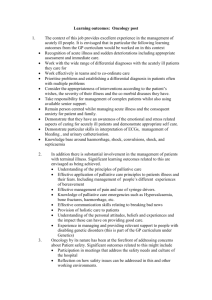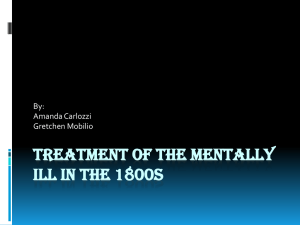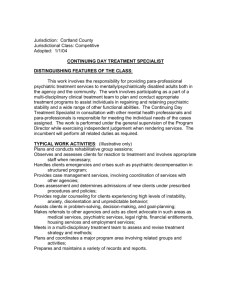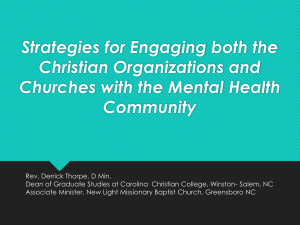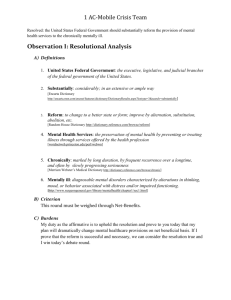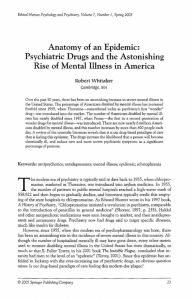State tax on millionaires funds housing for mentally ill
advertisement
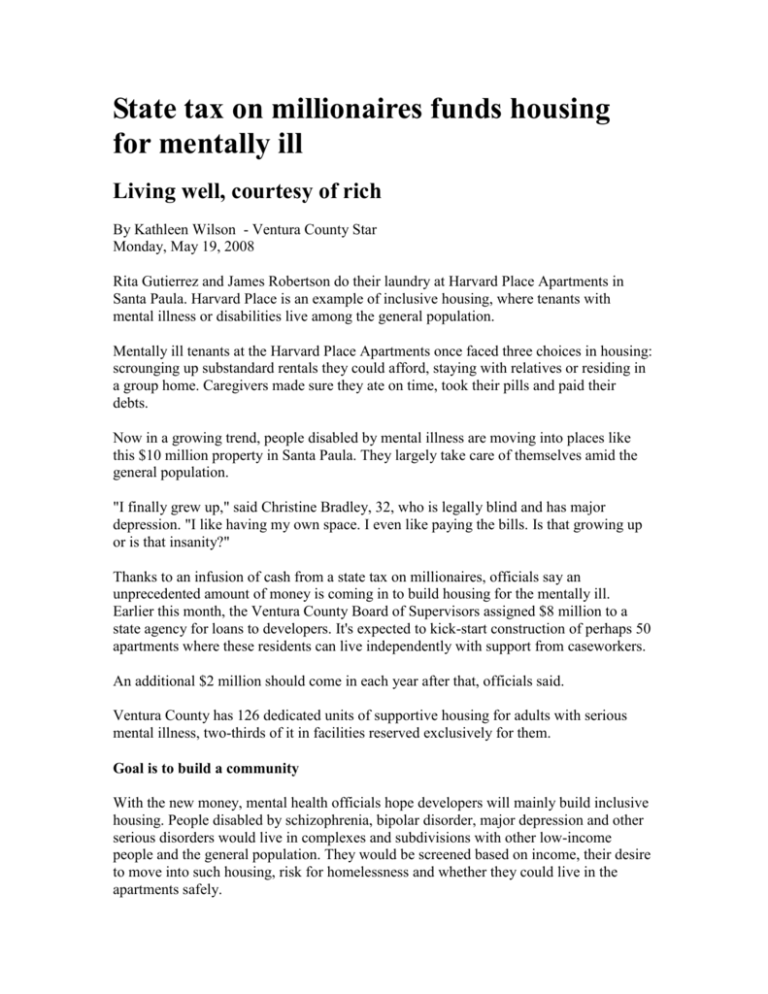
State tax on millionaires funds housing for mentally ill Living well, courtesy of rich By Kathleen Wilson - Ventura County Star Monday, May 19, 2008 Rita Gutierrez and James Robertson do their laundry at Harvard Place Apartments in Santa Paula. Harvard Place is an example of inclusive housing, where tenants with mental illness or disabilities live among the general population. Mentally ill tenants at the Harvard Place Apartments once faced three choices in housing: scrounging up substandard rentals they could afford, staying with relatives or residing in a group home. Caregivers made sure they ate on time, took their pills and paid their debts. Now in a growing trend, people disabled by mental illness are moving into places like this $10 million property in Santa Paula. They largely take care of themselves amid the general population. "I finally grew up," said Christine Bradley, 32, who is legally blind and has major depression. "I like having my own space. I even like paying the bills. Is that growing up or is that insanity?" Thanks to an infusion of cash from a state tax on millionaires, officials say an unprecedented amount of money is coming in to build housing for the mentally ill. Earlier this month, the Ventura County Board of Supervisors assigned $8 million to a state agency for loans to developers. It's expected to kick-start construction of perhaps 50 apartments where these residents can live independently with support from caseworkers. An additional $2 million should come in each year after that, officials said. Ventura County has 126 dedicated units of supportive housing for adults with serious mental illness, two-thirds of it in facilities reserved exclusively for them. Goal is to build a community With the new money, mental health officials hope developers will mainly build inclusive housing. People disabled by schizophrenia, bipolar disorder, major depression and other serious disorders would live in complexes and subdivisions with other low-income people and the general population. They would be screened based on income, their desire to move into such housing, risk for homelessness and whether they could live in the apartments safely. "We've never had money to put into a deal before," said Carolyn Briggs, housing director for the county Behavioral Health Department. "It represents a quarter to a third of development costs, but it's huge in that it's real money." The county has about 40 of these inclusive units, all in the cities of Santa Paula and Thousand Oaks. An additional 10 are being built at the RiverPark development in Oxnard and 15 are planned in Ventura. They can be difficult to erect because of complex financing and the "not in my backyard" syndrome. But some see a model in Harvard Place, where a housing complex opened in 2005 in place of a motel known for drug activity and prostitution. "We set out to build a community and I think it has materialized into that," said Ramsey Jay, executive director of the Santa Paula Housing Authority, which collaborated with Newbury Park nonprofit developer Partners in Housing to build the complex. In their corner now Ten apartments at the 40-unit Harvard Place are reserved for people with serious mental illness, 10 for people with developmental disabilities and the remainder for the authority's federal Section 8 housing list for low-income seniors and the disabled. Residents pay 30 percent of their income toward the rent, a deal that advocates call a "godsend" in Ventura County. Pete Zarate and his wife, Mary Jo, run the Mediterranean-style complex with a brick courtyard and community room. They live in an on-site apartment, where tenants sometimes knock on their door at 2 a.m. for help with personal problems. But they also enforce the rules. "I like having my own space. I even like paying the bills," said Christine Bradley. She said she got her apartment after waiting three years on the regular Section 8 list. If tenants don't pay the rent or repeatedly break the rules, they are evicted. That's happened to only two residents since the complex opened 2 1/2 years ago, Zarate said. Some tenants say they still face the stigma many associate with the mentally ill, but they have won converts among the other renters. Mary Adams, a 72-year-old widow living on Social Security, is in their corner now. Adams admits she was a little leery about living with people with serious mental illness when she moved here more than two years ago. "I didn't know what to expect," she said. "It's like anything else. Something you don't understand, you are afraid of." She has had no problems, she said, and would recommend the complex at 320 W. Harvard Blvd. Jay said concerns about the tenants disturbing the merchants next door also tended to be unfounded. "No problem at all," said Dzung Ho, owner of the 97 Cent Bargain Center. Mentally ill need housing, supportive services Bradley, who describes herself as high functioning, snagged a spot because she had waited for three years on the regular Section 8 list. Since moving out of her grandmother's home, she has become good friends with Rita Gutierrez, 43, who has schizophrenia. Gutierrez said she was living in a garage behind her mother's home in Piru before a mental health worker helped her get into the apartment. It marked the first time she has ever lived alone. Now she pays her own bills, invites Bradley over for Mexican dinners and walks across the street to the county mental health clinic for care. With its location on busy Harvard Boulevard, the two-story complex is nothing if not convenient. "Grocery stores are close by," Gutierrez said. "Restaurants are close by." Although the state of California has been moving people out of state hospitals since the 1960s, thousands of people disabled by mental illness still live with aging parents, in group homes, board-and-care facilities, in jail or on the streets. Experts say they need not only low-cost places to live in high-cost California but also supportive services such as help with medications and homemaking chores. Daniel Claudio and Susan Dudzinski live independently in a $10 million housing complex built for the mentally ill. Government funds are slated for more such housing. "If they are disabled they can't work, and if they can't work, they need some kind of support," said Rusty Selix, executive director of the Mental Health Association in California. "Factor in mental illness, and most are going to need some level of supportive services to be able to stay in the housing." Briggs and others say state funding for permanent, supported housing has lagged that for the developmentally disabled, many of whom are entitled to lifetime services under a California Supreme Court ruling. Now, though, Proposition 63 is starting to bring in the cash for the mentally ill. Passed in 2004 by the voters, the initiative imposed a 1 percent tax on income above $1 million. Then two years ago, state leaders decided to set aside funds from that tax to build 10,000 units of housing. 'We are all adults' Research shows dramatic improvements when homeless mentally ill people move into supportive housing, including sharp reductions in emergency room visits and hospitalizations. Anecdotally, those able to move from group care into supportive housing also seem to improve, Briggs said. It's an idea that advocates for the developmentally disabled have long pushed successfully. They point to clients like James Robertson, 41, who said he'd be in a group home if it weren't for his apartment at the Santa Paula complex. "I'm doing good," he said as he shows off his one-bedroom rental filled with thrift store furniture, framed doodle art, a pet fish and a St. Louis Rams sign above his bed. The state pays a firm specializing in independent living skills to help him with money management, finding a doctor and housekeeping. Fellow tenant Steve Taylor requires a higher level of care. An aide stays at his apartment around the clock to help the man who has faced both mental illness and developmental disabilities. To him, that's still better than living in a care home where staff members watch over his every need. "We are all adults," he said.


